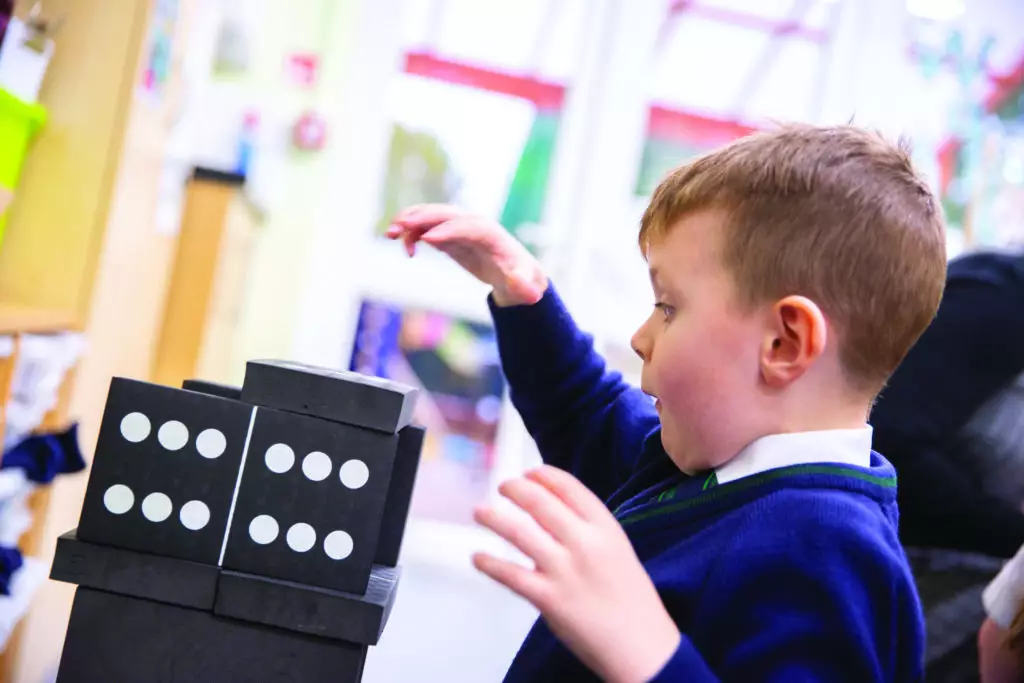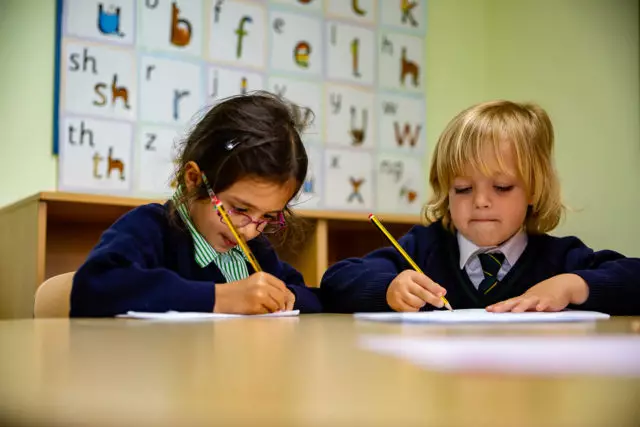What are the key skills that children learn from playing games?
- Turn taking and sharing
- Team work
- Problem solving
- Reasoning skills – planning ahead and predicting outcomes
- Negotiation and language skills
- Resilience
- The ability to follow instructions
- Learning about winning and losing
Simple Track Games
- Track games help children to develop a mental number line, as well as an understanding of the magnitude of numbers in comparison to each other.
- An example is Snakes and Ladders
- Explain your reasoning process out loud- e.g. “I hope I roll a 6 because then I will be able to go up the ladder” “I hope I don’t roll a 3 because then I will have to slide down the snake.”
- Help your child to make their own simple track games (1-10 initially and then increase to 1-20). Make sure you include a clearly identified space for the start and finish of your track game. Encourage your child to create a track game on the paving slabs outside.
- Help your child to make a set of counters linked to their current interests, e.g. characters from Peppa Pig, Paw Patrol or Disney
- As your child becomes more confident they will start to predict what number they need to roll in order to win!
Bunny Ears
- Say a number from 1-10 and encourage your child to represent this on their fingers (without looking at them and whilst holding them on top of their head, like a bunny!) Encourage your child to represent the same numbers in different ways, “can you show me a different way of making 7?”
- A variation of the game is to make pairs totalling a certain number. Show your child a number (in the form of bunny ears) and encourage your child to make the corresponding number on their fingers in order to total the target number (e.g. “we’re making 10, I’m showing you 3, what number do you need to show me?”)
Dotzi
- This game helps children to develop the skill of subitising (the process of immediately knowing how many objects are in a small group without needing to count them)
- Decide on a number 1-6. Roll 10 dice. Take away the dice which show the target number. Keep rolling until all dice show the chosen number.
- Variation to the game – dice can be removed if they have a difference of 1 or 2 from the target number.
- Encourage your child to start a dice collection (dots, numerals, varying sizes, colours and materials).
Skittles
- As well as shop bought game sets, these can be home-made using plastic bottles and water, sand or rice.
- Encourage your child to count how many they have knocked over and how many are still standing.
- Model how to draw some lines or circles to represent the skittles. Cross them off when you have knocked some down to work out the number left. Once your child is confident with this, you could move on to recording number sentences using dots first and then numerals.
Bingo
- Surely everyone loves a game of Bingo?! Especially if you use some of the rhyming bingo phrases, such as “cup of tea, number 3” “garden gate, number 8” “dancing queen, number 17”
- As well as shop bought versions, Bingo games can easily be made at home using the numbers that your child is currently working on.
- In my experience, children love to use a bingo dabber.
Top Trumps
- Look out for Top Trump sets with smaller numbers as a good starting point.
- This game helps children to understand the magnitude of numbers in comparison to each other.
- Help your child to make their own set of Top Trump cards linked to their interests.
Uno
- This is a firm favourite when the Savage family are camping.
- This game helps your child to practise matching numbers and colours, with plenty of practise for counting too.
- As your child becomes more confident they will not only start thinking about the best way to win, but the best cards to play to prevent others from winning.
10 Lovely Things
- Each player has 10 lovely things in a bowl, (e.g. buttons, feathers, pom poms, gems) takes it in turns to roll the die, (I would suggest using a dot die first and then introducing a numeral die) and give that many items to the person on their right. The winner is the player who ends up with the most amount of lovely things in their bowl.
- This games develops your child’s understanding of more/less and addition.
Dominoes
- Another great game for helping children to be able to subitise numbers.
- Encourage children to match numerals cards to the number representation on the domino
- Leave out a range of resources such as buttons, googly eyes and pom poms and encourage your child to match and count the resources to the dots on the dominoes
- Talk about and predict which dominoes have the most or the least amount of dots on them
We operate an all year round Admissions process but now have only limited places in our Reception and Infant classes available for September 2020. Find out more about Reception and the rest of the Juniors.



